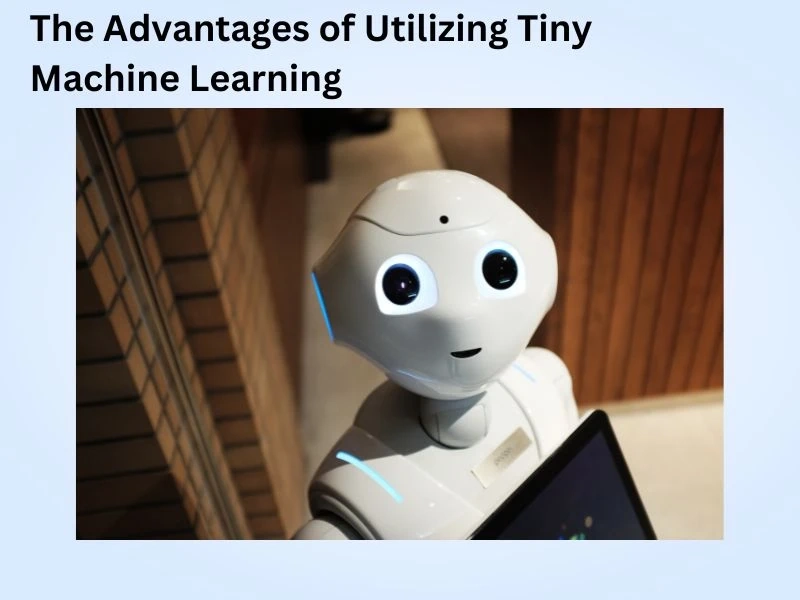TinyML (Machine Learning) is an exciting new technology that allows for increased development of powerful, low-power and energy-efficient ML solutions. This technology was created in response to developments in edge computing, data storage, and model compression, all of which have made it possible to run advanced intelligent models on tiny microcontrollers.
The advantages of TinyML are many; from low-powered edge devices to cost efficiencies and data storage, it enables developers to utilize AI solutions wherever they're needed. It has opened the door to applications that require machine learning but don't possess the necessary processing power or memory size to do so. This means that with TinyML you can create a flexible, portable and dynamic AI solution with minimal effort.
TinyML also makes working with sensors and actuators incredibly easy, as they can be integrated into small embedded systems that can monitor or control the environment around them. You can also easily use TinyML models on any device ranging from a smartphone to a tiny microcontroller, giving you the ability to embed smart features into all sorts of products. With its portability and flexibility, AI solutions are now available everywhere, making it possible for developers to bring about complete digital transformation without needing large powerful servers or large amounts of computing resources.
Data Science Course in Kolkata
In conclusion, Tiny Machine Learning is an invaluable tool for developers looking to create intelligent solutions with minimal resources. Its low power requirements and flexibility make it ideal for edge computing and small device integration, allowing you to create custom AI powered applications anywhere and everywhere quickly and easily. With its broad range of advantages such as portability, cost efficiency and data storage.
Applications for TinyML in IoT Solutions
TinyML is a quickly growing field of Machine Learning that focuses on shrinking the size of AI models to fit into embedded or mobile devices. This technology is revolutionizing the way we use IoT solutions, as it is making possible a new wave of applications that were not previously possible.
In this blog post, we’ll explore how TinyML works and discuss how it can be used in IoT solutions. We’ll also go over the important components necessary to set up an effective TinyML solution and provide an overview of emerging technologies such as Edge AI and Embedded ML.
To understand what TinyML is, we must first explore its core concept: machine learning. Machine learning (ML) is a type of Artificial Intelligence (AI) that can learn given data without being explicitly programmed. It has far-reaching applications, from automated marketing intelligence to natural language processing. What sets ML apart from traditional AI methods is its ability to evolve and adapt with exposure to data patterns by optimizing algorithms and neural networks to perform data-driven tasks with higher accuracy over time.
TinyML takes ML one step further by shrinking the size of models for edge or embedded devices—devices that usually contain limited memory and computing power such as smartphones or wearables like fitness trackers. TinyML allows us to create more powerful AI services specifically designed for low-cost hardware with smaller footprints. By leveraging advanced compression techniques, developers are able to reduce the memory requirements and get closer to the goal of running ML on small devices while still achieving good accuracy levels.
Types of Artificial Intelligence Powered by TinyML
TinyML is a lower power AI that's designed for processing sensor data using Machine Learning algorithms and Deep Neural Networks. It supports both discrete and continuous models, making it ideal for powering embedded systems and IoT devices with limited resources. This makes it possible to run AI on small, battery-powered devices that don’t require much computing power and energy.
TinyML also enables edge computing applications by bringing machine learning functionality to the “edge” – meaning it can help process data locally and in real time, without requiring transferring large amounts of data over networks or cloud platforms. This means less latency for faster response times, improved security due to data not being stored in the cloud, as well as low latency since the data doesn't need to travel larger distances over the Internet.
Data Science Course in Kerala
Overall, TinyML has a vast range of potential applications – from powering smart home appliances such as thermostats or personalized assistant bots; to biometric security applications like facial recognition doorbells; to monitoring health vitals such as heart rate or respiration; or even aiding autonomous driving systems with object detection capabilities.


